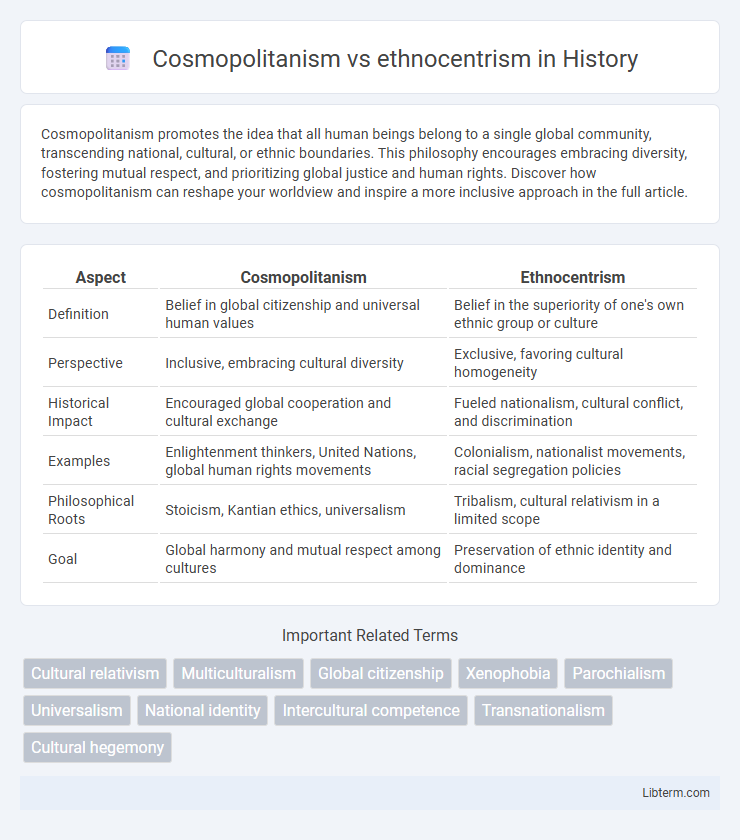Cosmopolitanism promotes the idea that all human beings belong to a single global community, transcending national, cultural, or ethnic boundaries. This philosophy encourages embracing diversity, fostering mutual respect, and prioritizing global justice and human rights. Discover how cosmopolitanism can reshape your worldview and inspire a more inclusive approach in the full article.
Table of Comparison
| Aspect | Cosmopolitanism | Ethnocentrism |
|---|---|---|
| Definition | Belief in global citizenship and universal human values | Belief in the superiority of one's own ethnic group or culture |
| Perspective | Inclusive, embracing cultural diversity | Exclusive, favoring cultural homogeneity |
| Historical Impact | Encouraged global cooperation and cultural exchange | Fueled nationalism, cultural conflict, and discrimination |
| Examples | Enlightenment thinkers, United Nations, global human rights movements | Colonialism, nationalist movements, racial segregation policies |
| Philosophical Roots | Stoicism, Kantian ethics, universalism | Tribalism, cultural relativism in a limited scope |
| Goal | Global harmony and mutual respect among cultures | Preservation of ethnic identity and dominance |
Understanding Cosmopolitanism: A Global Perspective
Cosmopolitanism emphasizes embracing cultural diversity and global interconnectedness, promoting values of inclusivity and mutual respect across national and ethnic boundaries. It contrasts with ethnocentrism, which centers on viewing one's own culture as superior, often leading to prejudice and exclusion. Understanding cosmopolitanism involves recognizing the shared humanity that transcends local identities, fostering cooperation and dialogue in an increasingly globalized world.
Defining Ethnocentrism: The Inward Look
Ethnocentrism refers to the tendency to view one's own culture or ethnic group as superior and to evaluate other cultures based on one's own cultural standards. This inward-looking perspective fosters group loyalty but also breeds prejudice and misunderstandings across diverse societies. In contrast to cosmopolitanism, ethnocentrism limits cross-cultural empathy and global cooperation by emphasizing cultural separation and hierarchical judgment.
Historical Roots of Cosmopolitanism and Ethnocentrism
Cosmopolitanism traces its historical roots to ancient Greek philosophy, particularly the Cynics and Stoics, who advocated for global citizenship transcending local identities. Ethnocentrism, by contrast, emerged from tribal and early societal structures where group cohesion depended on prioritizing one's own culture and viewing others as inferior. The tension between these concepts has shaped intercultural relations throughout history, influencing everything from empire-building to modern globalization.
Key Principles: Openness vs. Cultural Superiority
Cosmopolitanism emphasizes openness to diverse cultures, promoting mutual respect and global citizenship that transcends national or ethnic boundaries. Ethnocentrism, by contrast, asserts cultural superiority, judging other cultures by the standards of one's own and often fostering exclusion and bias. Key principles of cosmopolitanism involve embracing pluralism and intercultural dialogue, while ethnocentrism centers on maintaining cultural dominance and resistance to external influences.
Social Impacts of Cosmopolitanism
Cosmopolitanism fosters social cohesion by promoting inclusivity, cultural exchange, and global citizenship, which can reduce prejudice and ethnocentric attitudes. It enhances cross-cultural understanding and cooperation, facilitating innovation and economic growth in diverse societies. This global outlook supports human rights advocacy and equitable resource distribution, contributing to social justice and more harmonious multicultural communities.
Consequences of Ethnocentrism in Society
Ethnocentrism fosters social division by promoting in-group superiority and out-group discrimination, often leading to prejudice, intolerance, and conflict within diverse societies. This mindset undermines social cohesion, impedes cross-cultural communication, and perpetuates systemic inequalities that marginalize minority groups. Long-term consequences include reduced social mobility, increased ethnic tensions, and obstacles to collaborative problem-solving in multicultural communities.
Cosmopolitanism in a Globalized World
Cosmopolitanism in a globalized world emphasizes embracing cultural diversity and fostering global citizenship beyond national or ethnic boundaries. It advocates for mutual respect, understanding, and cooperation among diverse populations, promoting inclusive values and shared responsibilities on a global scale. This worldview challenges ethnocentrism by encouraging individuals to recognize interconnectedness and prioritize global well-being over parochial interests.
Ethnocentrism’s Role in Conflict and Division
Ethnocentrism fuels conflict and division by promoting the belief in the inherent superiority of one's own ethnic group, leading to prejudice and discrimination against others. This mindset often results in social fragmentation, intergroup hostility, and impedes cooperation across diverse communities. Historical and contemporary conflicts, such as ethnic riots and nationalist movements, frequently stem from ethnocentric ideologies that undermine cosmopolitan values of global interconnectedness and mutual respect.
Bridging the Gap: Towards Inclusive Societies
Bridging the gap between cosmopolitanism and ethnocentrism involves fostering inclusive societies that value cultural diversity while promoting shared human values. Emphasizing intercultural dialogue and mutual respect reduces ethnocentric biases, encouraging openness and global citizenship. Policies supporting education in multiculturalism and inclusive social frameworks enhance cohesion and harmonious coexistence across diverse communities.
Future Outlook: Embracing Diversity or Maintaining Boundaries
Future outlook on cosmopolitanism emphasizes embracing diversity, promoting global cooperation, and fostering inclusive identities that transcend national and ethnic boundaries. Ethnocentrism, by contrast, prioritizes maintaining cultural and social boundaries to preserve traditional values and group cohesion, often resisting global integration. The ongoing challenge lies in balancing these perspectives to create societies that are both unified and respectful of cultural uniqueness.
Cosmopolitanism Infographic

 libterm.com
libterm.com